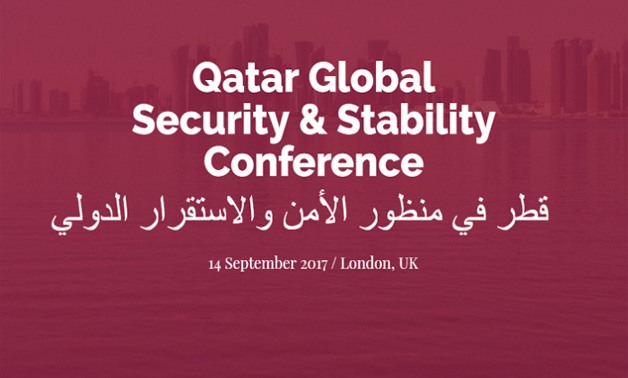
Qatar global security, stability Conference in London - press photo
CAIRO – 15 September 2017: The Qatar global security and stability conference concluded Friday in London with the participation of exiled Qataris pressing for reform in the country which faces a diplomatic crisis in the Gulf region entering its fourth month.
International experts, politicians and journalists have participated in the conference to discuss several topics regarding combating terrorism and maintaining the stability of the Gulf. The participants stressed that Qatar should define its loyalties, and choose between returning to the Gulf and joining international efforts to combat terrorism or aligning with Iran and facing international isolation.
The Qatari opposition spokesperson, Khalid Al-Hail, delivered the opening speech of the conference, revealing that the Qatari regime attempted to inhibit the conference, which stresses on the necessity of changing the regime for its support for terror, through bribes and media campaigns.
“The authorities in Qatar paid bribes and launched a media campaign in an attempt to stop the first conference of the Qatari opposition, which can be a turning point in the future of the Arab peninsula.” Al-Hail said.
He added that Qatari authorities have deprived many citizens of their nationality, and arrested many others, noting: “Change sought by the people of Qatar will not be filled with roses”.
Al-Hail stressed that the conference aimed to uncover the reality of the political situation in Qatar, and provide space for freedom of expression, in the wake of the “policy of silencing the mouths exercised by the Qatari system”.
The conference program included five main themes: Doha’s role in spreading political Islam and supporting terrorism; the relationship between Qatar and Iran as a major source of regional instability; Qatar’s aspirations for global influence against democracy and human rights; free media or the trumpet of terrorism; and, finally, economics, geopolitics and international energy security.
1- Political Islam and terrorist groups
The conference referred to the financial, media and political support provided by the Qatari regime to political Islam groups and terrorist organizations, especially the Muslim Brotherhood, Al-Qaeda affiliate Al-Nusra Front and Taliban.
Paddy Ashdown, the former leader of the UK's Liberal Democrat, said that political Islam groups such as Hamas and the Muslim Brotherhood were engaged in violence to achieve strategic political goals. He added that Qatar pretends defending democracy and human rights while it supports such groups.
2- Qatar and Iran’s foreign policy
On the relationship between Qatar and Iran, General Charles F. Wald, former Deputy Commander of United States European Command, said that Qatar's insist to supporting Iran and terrorism would lead to further international isolation for the Gulf state. He hinted that U.S. may transfer its military base from Qatar to another Gulf state if Qatar continued to support the Iranian policies in the region.
3- Democracy, human rights and a quest for global prestige
Sheikh Mohammed bin Hamad bin Julab al-Murra, one of Al-Murra tribe’s leaders, spoke about the inhumane treatment the tribe facing in Qatar, including displacement, deprivation of nationality, education and health services, arrests and torture. He called on the Gulf and Arab governments, as well as international human rights organizations to intervene to end this tragedy.
4- Al-Jazeera – free press or voice of terror
A bilateral discussion occurred between t BBC's world affairs editor John Simpson and the former director of Al-Jazeera English office in Cairo, Mohamed Fahmy.
Fahmi said that the editorial policy of Al-Jazeera was guided by the Qatari royal family, particularly during the Arab Spring, where the Qatari regime was using Al-Jazeera to achieve its foreign political agenda. He added that the editorial policy of Al-Jazeera has contributed to the spread of terrorist ideas in the region through giving the opportunity to terrorist leaders to appear on the channel and demonstrate their criminal ideas.
5- Qatar’s economic and geopolitical influence
Iain Duncan Smith, former leader of the British Conservative party, said the current instable relationship between Britain and Russia has prompted Britain to rely on Qatar's natural gas. Therefore, the British government is concerned about the relationship between Qatar and Gulf and Arab states. He added that the country's intervention in the internal affairs of other Arab countries may affect Britain's long-term interests in the region.
The opposition conference will be followed by a series of events and activities related to the current crisis in Qatar and the future of the country from the perspective of its people.

Comments
Leave a Comment